Stocks on Wall Street ended mixed in volatile trade on Friday to cap off another punishing week, with the benchmark S&P 500 briefly falling into bear market territory amid worries over surging inflation, a slowing economy, and rising interest rates.
The benchmark S&P 500 index and the tech-heavy NASDAQ Composite both logged their seventh consecutive weekly decline, the longest losing streak for both indices since 2001.
The blue-chip Dow suffered its eighth straight weekly loss, its longest since 1932, during the Great Depression.
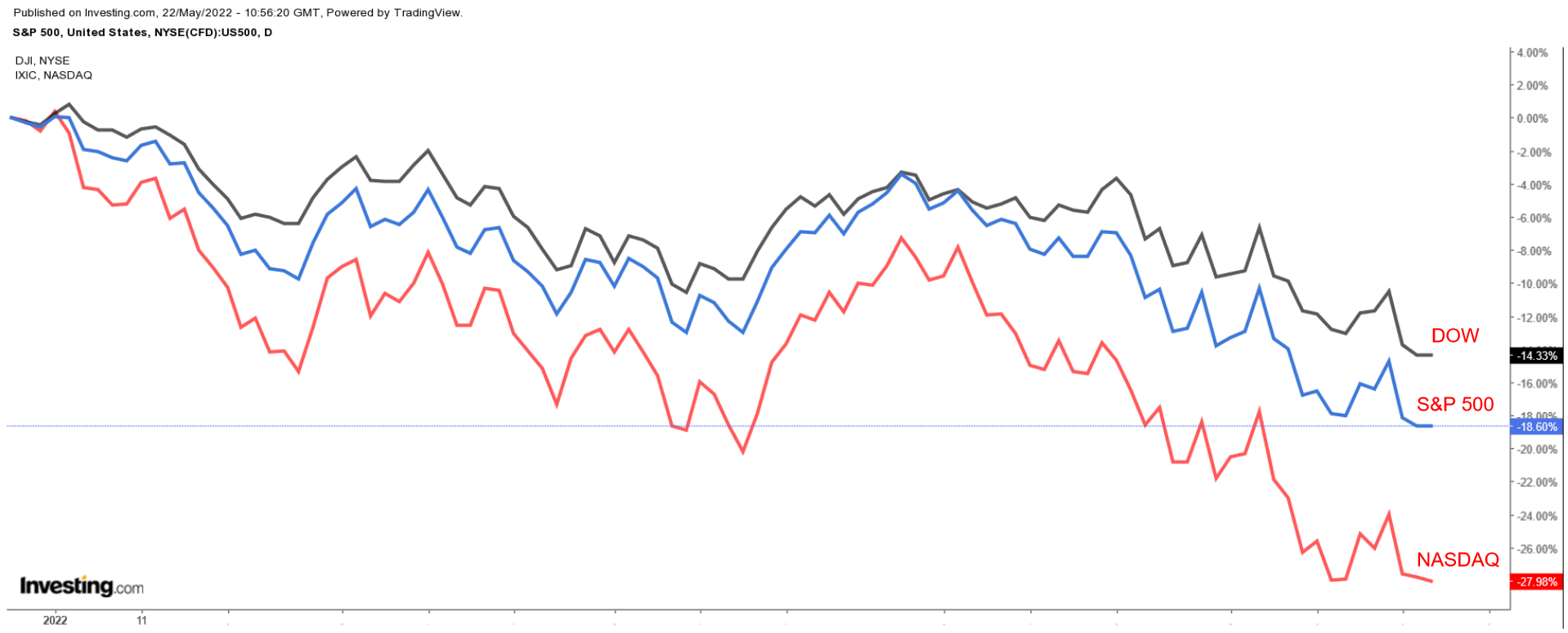
The coming week is expected to be another busy one with more earnings from high-profile companies like NVIDIA (NASDAQ:NVDA), Zoom Video (NASDAQ:ZM), and retailers such as Costco (NASDAQ:COST), Macy’s (NYSE:M), Nordstrom (NYSE:JWN), and Dollar General (NYSE:DG).
In addition to earnings, the highlight on the economic calendar will be the latest personal income and spending data, which includes the PCE Price Index, the Fed’s preferred inflation measure.
Regardless of which direction the market goes, below we highlight one stock likely to be in demand and another which could see further downside.
Remember though, our timeframe is just for the upcoming week.
Stock To Buy: Alibaba
Shares of China's largest e-tail giant, Alibaba Group Holdings (NYSE:BABA)—which are trading near their lowest level since spring 2017—could see increased buying activity in the coming days as one of China’s most valuable technology companies prepares to release its latest financial results.
Consensus estimates call for the Hangzhou, China-based tech giant, sometimes referred to as the 'Amazon of China' to announce earnings per share of ¥7.17 ($1.07) for the first three months of 2022, falling 30.5% from EPS of ¥10.32 ($1.54) in the year-ago period.
Revenue is expected to have risen 6.4% year-over-year to ¥199.48 billion ($29.8 billion), according to InvestingPro+.
Results are due before the U.S. market opens on Thursday, May 26.
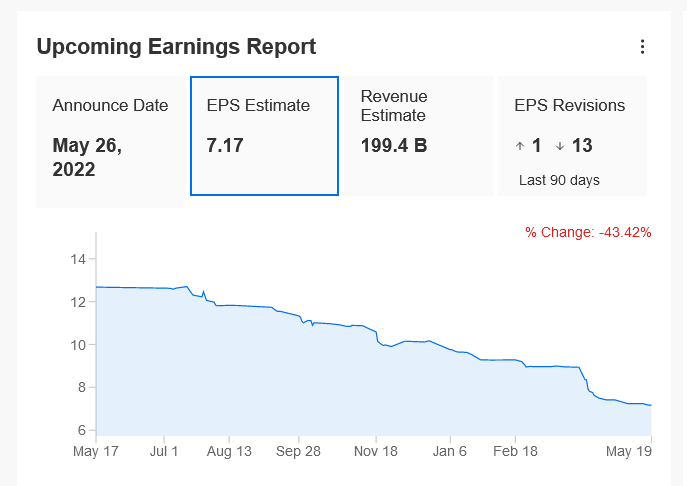
Source: InvestingPro+
If confirmed, it would mark Alibaba’s slowest quarterly sales growth since going public in 2014, reflecting the negative impact of Beijing’s year-long tech crackdown, intensifying competition from the likes of JD.com (NASDAQ:JD), Pinduoduo (NASDAQ:PDD), and ByteDance, as well as lingering COVID-related macroeconomic headwinds.
Perhaps of greater importance, investors will be eager to hear commentary from Alibaba chief executive Daniel Zhang regarding the outlook for the months ahead amid recent signs that China’s anti-tech regulatory clampdown may be easing.
Chinese authorities began a broad regulatory crackdown aimed at reining in its powerful tech sector and booming platform economy in late 2020, including imposing hefty fines, and launching numerous antitrust investigations.
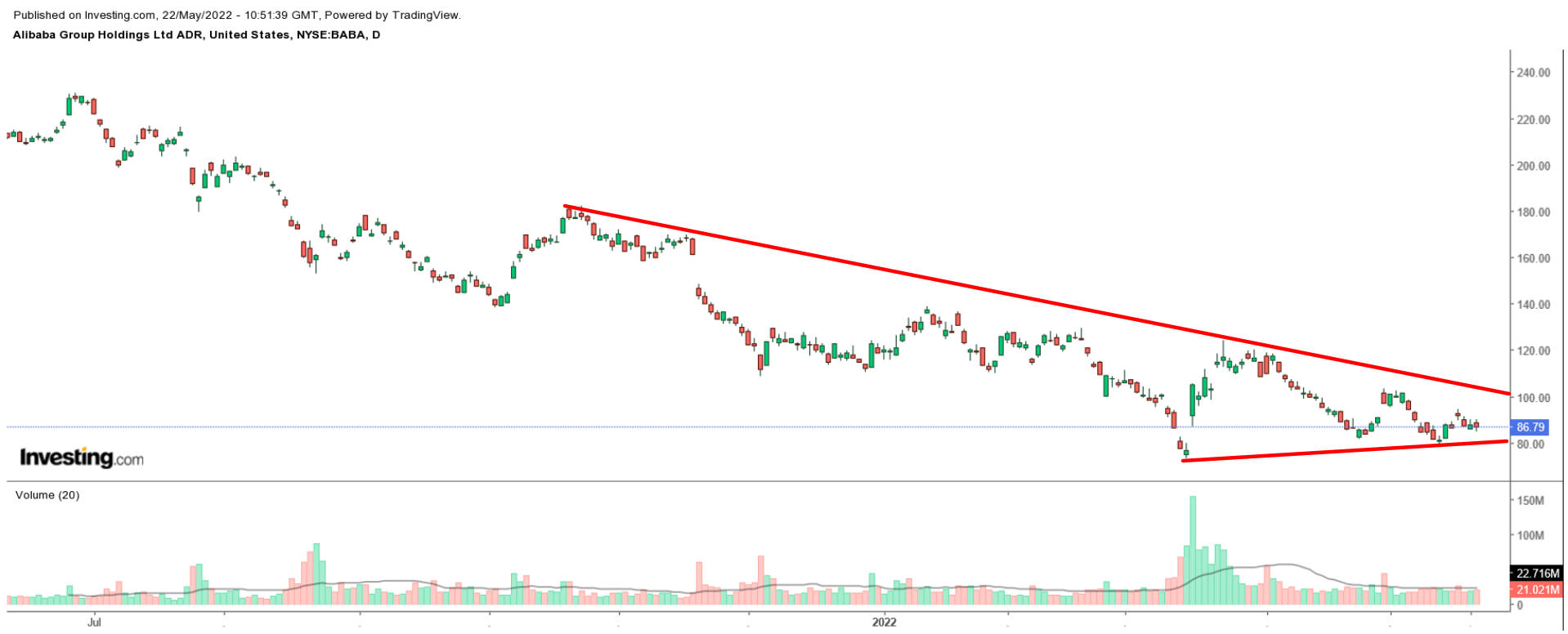
BABA has climbed roughly 19% since falling to a six-year low of $73.28 on Mar. 15. It ended Friday’s session at $86.79. At current levels, the e-commerce and cloud computing powerhouse has a market cap of $233.2 billion.
Despite the recent bounce, Alibaba shares are still down 27% year-to-date and are roughly 73% below their record peak of $319.32 reached in October 2020.
Analysts are still bullish on Alibaba stock. With a fair value of $144.16 per share, the quantitative models in InvestingPro+ point to 66% upside from Friday’s closing level as investors assess diminished risks related to the regulatory crackdown.
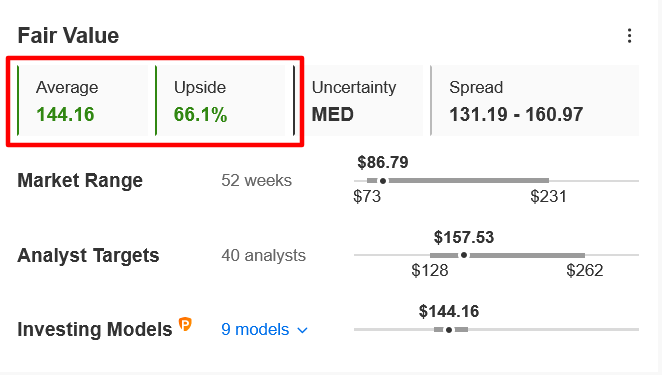
Source: InvestingPro+
Stock To Dump: Best Buy
Best Buy's (NYSE:BBY) stock, which sank more than 16% to its lowest level since April 2020 last week, is expected to suffer another volatile week as investors brace for disappointing financial results and weak guidance from one of America’s largest tech gadget retailers.
According to InvestingPro+, analysts forecast the consumer electronics chain's earnings to drop 29.1% from the same quarter a year earlier to $1.58 per share when it delivers first quarter numbers ahead of the opening bell on Tuesday, May 24.
Sales are expected to fall roughly 10% year-over-year to $10.46 billion, as shoppers cut back spending on televisions, tablets, computers, and other discretionary items and divert more spending into basic needs and services amid the current environment.
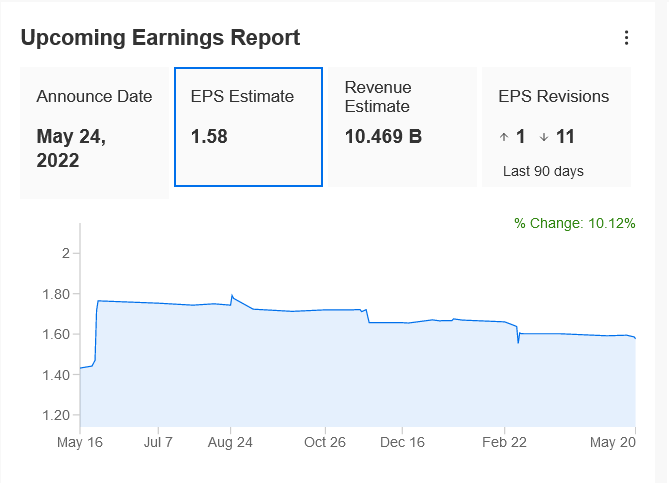
Source: InvestingPro+
As such, investors will pay close attention to growth in Best Buy’s domestic same-store sales, which fell 2.3% in the previous quarter.
Beyond the top-and-bottom line numbers, Best Buy’s profit and sales guidance for the coming months will be scrutinized as the retailer struggles with soaring inflationary pressures, higher fuel and freight costs, and supply chain disruptions.
Commentary regarding the health of the economy and the U.S. consumer from executives on Best Buy’s post-earnings conference call will also be in focus after downbeat remarks from Walmart (NYSE:WMT) and Target (NYSE:TGT) sent the sector reeling this past week.
Based on moves in the options market, traders are pricing in a sizable swing for BBY shares following the report, with a possible implied move of about 8% in either direction.
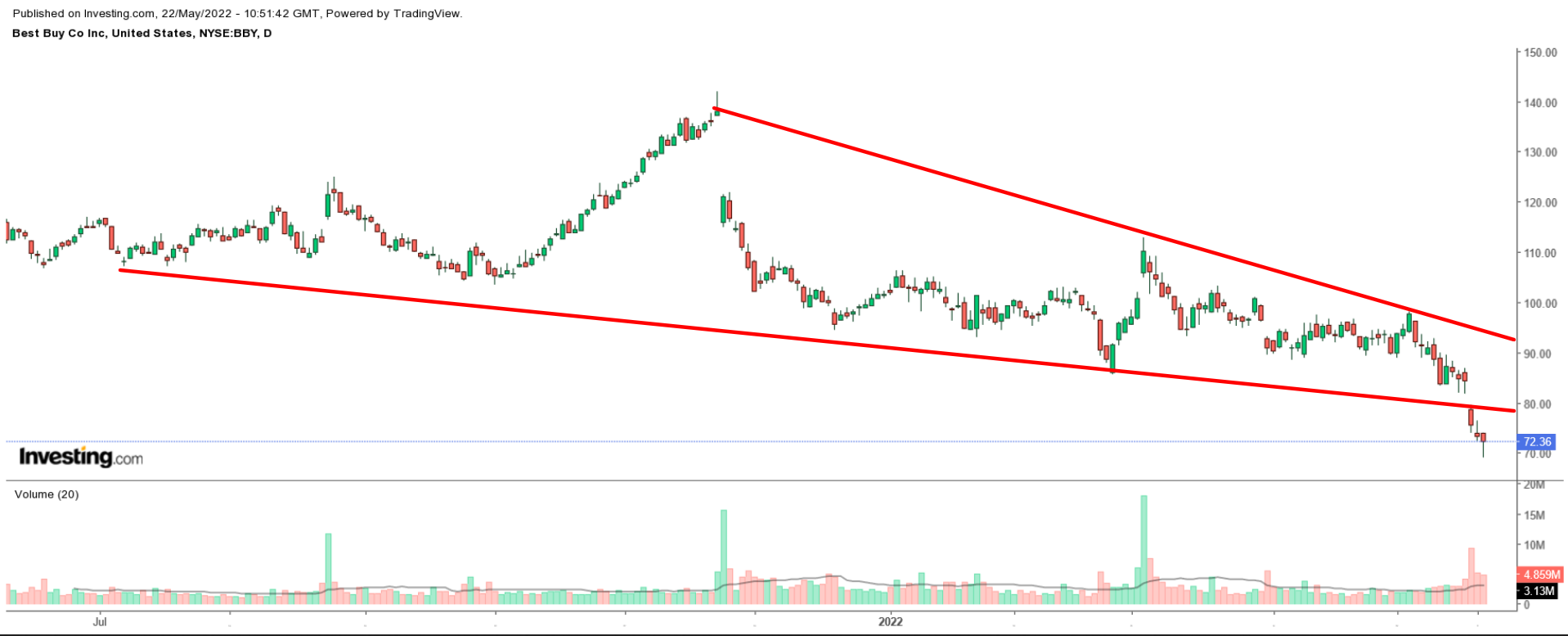
Shares of BBY closed at a two-year low of $72.36 on Friday, earning the Richfield, Minnesota-based consumer electronics retailer a market cap of roughly $16.3 billion.
Year-to-date, Best Buy shares are down 28.8%, underperforming the broader market over the same timeframe. It currently sits 49% below its all-time peak of $141.97 touched in November 2021.
Interested in finding your next great idea? InvestingPro+ gives you the chance to screen through 135K+ stocks to find the fastest growing or most undervalued stocks in the world, with professional data, tools, and insights. Learn More »
